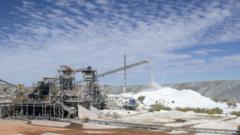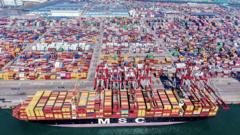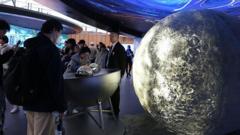With the increasing trade tensions and China's recent restrictions on rare earth elements, Australia's Prime Minister Anthony Albanese has announced plans for significant investment in a strategic reserve aimed at bolstering the country's role as a key player in critical minerals production and refining.
Australia Eyes Rare Earth Opportunity Amid China’s Export Halts

Australia Eyes Rare Earth Opportunity Amid China’s Export Halts
As China implements restrictions on rare earth exports, Australia’s Prime Minister Albanese proposes a major investment to develop a strategic reserve of critical minerals.
In a move shaped by escalating trade tensions, Australia is positioning itself as a potential alternative supplier of rare earth minerals, crucial for high-tech industries. Prime Minister Anthony Albanese has vowed to allocate A$1.2 billion (£580 million) towards establishing a strategic reserve for critical minerals, contingent on his party's success in the upcoming election.
This announcement follows China's imposition of export restrictions on seven rare earth elements, essential components in manufacturing advanced technologies, including electric vehicles and sophisticated weaponry. These controls, affecting all nations, appear to be a response to the high tariffs imposed by former US President Donald Trump, currently at 145%.
Albanese highlighted the importance of prioritizing minerals vital for Australia's security as well as that of its allies. Nevertheless, the question remains whether Australia can challenge China's existing dominance in the rare earth sector.
Rare earth minerals, comprising 17 elements with characteristics that make their extraction and refinement complex, are pivotal for technologies that will shape future advancements. Minerals like samarium and terbium are integral to emerging technologies, including electric vehicles and advanced military applications.
Despite having substantial rare earth reserves, China currently refines approximately 90% of these minerals, granting it substantial leverage over global supply and triggering concerns among Western governments about dependence on Chinese refinement.
The rationale behind Beijing's recent restrictions is reportedly its response to US tariffs, which analysts suggest has raised alarms within Washington, particularly as the reliance on Chinese imports for rare earths has reached 75% between 2019 and 2022. Philip Kirchlechner, a Perth-based market analyst, indicated that the US and EU have overlooked the significance of rare earths, thereby allowing China to consolidate its refining monopoly.
Elon Musk, CEO of Tesla, commented that the cessation of rare earth exports from China could hinder innovations at his company, a testament to the tangible effects of such geopolitical moves on technological enterprises in the West.
Albanese’s investment strategy signals an attempt to decentralize rare earth supplies and ensure access for both domestic industries and international partners, notably the US and EU. Despite this, experts, including Kirchlechner, caution that stockpiling critical minerals alone may not resolve the fundamental issue of China's grip on the refining process.
Australia produces a considerable proportion of the world's lithium, a vital component in EV batteries and solar technology, yet refines a fraction of it compared to China. Australian efforts to expand its own refining capabilities include significant investments like the recent A$840 million funding for the country’s first combined mine and refinery by Arafura Rare Earths.
Nonetheless, projections by the Center for Strategic and International Studies suggest that Australia may still depend on China for the refinement of rare earths at least until 2026.
As tensions with China rise, Australia's approach could further evolve. The Chinese ambassador to Canberra has criticized the US trade stance and has urged Australia to collaborate with Beijing, a proposition Albanese has firmly rebuffed.
Ultimately, while Australia’s strategy targets bolstering its mineral industry and fostering partnerships with Western allies, experts warn that complete independence from China, especially in refining capabilities, remains a significant challenge. Alicia García-Herrero, chief economist for Asia-Pacific at Natixis, notes that Australia’s strategy must adapt to potential Chinese controls over exports, leveraging its reserves to mitigate price influences that China exerts on global markets.





















